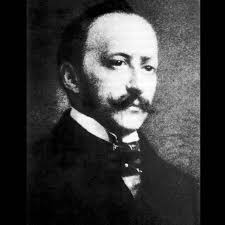Great Caesar's Ghost (1898)
“Ritz” describes over -the -top- ostentation; it is also the name of the iconic French hotel. The part of speech and the place owe their existence to César Ritz.
Ernest Hemingway stated, “When I dream of an afterlife in heaven, the action always takes place in the Paris Ritz. After a few brandies I slip into one of those huge Ritz beds. There’s a bolster for my head the size of the Graf Zeppelin and four-square pillows-two for me, and two for my quite heavenly companion.” The author would have had to lay his hat-among other things- had it not been for “the king of hoteliers and the hotelier of kings.” 
In 1850, César Ritz was born in Niederwald, a village in Valais, Switzerland, the thirteenth child of a farmer whose chore was tending the family’s sheep. César left home at age fifteen to apprentice at a hotel in nearby Brig. The manager fired César, “You need a special flair in the hotel business and you haven’t a trace of it.” Undaunted, César headed to Paris and waited tables in the fashionable Voisin. The Prince of Wales, later King Edward VII, told him, “Ritz, you know better than myself what I like. Just arrange a dinner according to my tastes.” During the 1871 Siege of Paris, food was so scarce that the zoo slaughtered two of its elephants; Voisin received the trunks. César’s concoction of trompe sauce chasseur proved a sensation. The connoisseur of cuisine and hospitality coined the phrase, “The customer is always right.”
The dream of owning his own hotel came to pass in Paris; the site was on the Place Vendome, once the private residence of the Duc de Lauzun. César remarked, “It is a little house to which I am very proud to see my name attached.” Some little house. Madame Ritz exulted, “They came!” The guests were legendary: the Prince of Wales, Oscar Wilde, F. Scott Fitzgerald and Zelda, Charlie Chaplin. Coco Chanel lived at the Ritz, (at one point with her Nazi lover,) for thirty-four years. No doubt the patrons visited the luxury stores that line its corridor, aptly named “Temptation Walk.”
During the German Occupation, Herman Goering, commander-in-chief-of the Luftwaffe, took over the imperial suite. His excuse for his lengthy stays was it put him closer to Britain’s Blitz; it also put him closer to the priceless art he was confiscating from the Rothschilds and other wealthy Jews. The destination of the treasures was the Goering mansion near Berlin.
César micromanaged preparation to celebrate Edward’s coronation. When the royal contracted peritonitis that postponed the event, the overworked César had a nervous breakdown, followed by another the following year. He took to hurtling abuse and ashtrays at his famous guests and passed away in 1918. His grave resides in his Swiss alpine village.
His widow, Marie-Louise, ran the hotel for fifty years, the first woman hotel manager. In 1979, the Ritz heirs sold their hotel for $30 million to billionaire Mohammad al- Fayed who lavished $150 million on his new crown jewel. Eighteen years later, Princess Diana and her boyfriend, the owner’s son, Dodi al-Fayed, had their last meal at the Ritz. They perished when their inebriated chauffeur, an employee of the hotel, crashed their Mercedes.
Marcel Proust wrote portions of Remembrance of Things Past at the Ritz and visiting the famed establishment their shades yet linger: Hemingway’s champagne celebration at the defeat of the Nazis with his quip he was liberating the bar. A magic memory would be to spend a night in one of its oversized beds, along with a heavenly companion. If the companion slips a gift from “Temptation Walk” under the pillow all the sweeter rest. And presiding over the guests from yesteryear would be the one-time Swiss shepherd. The Ritz remains a little home to great César’s ghost.

